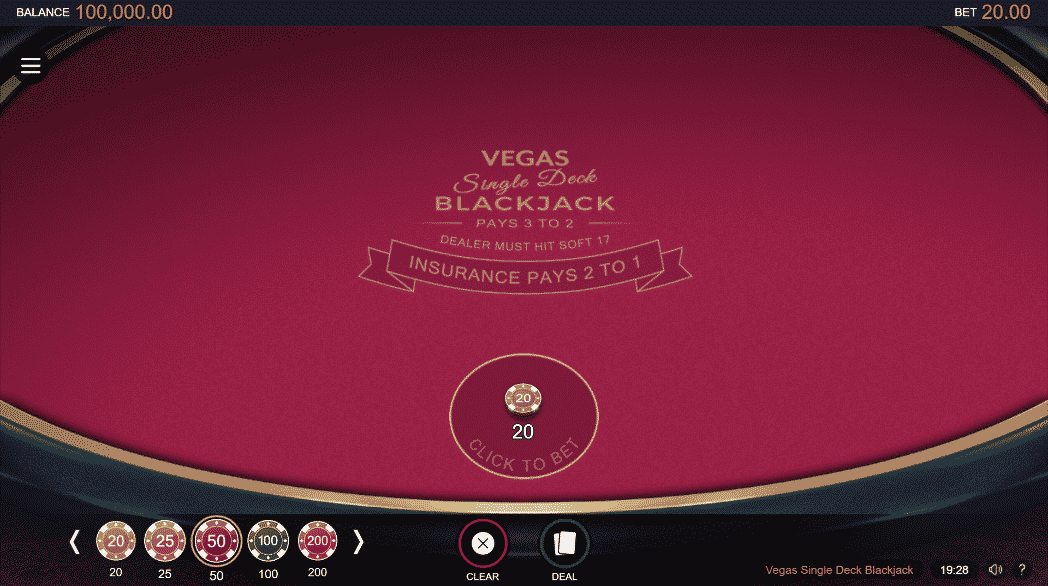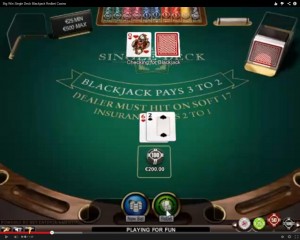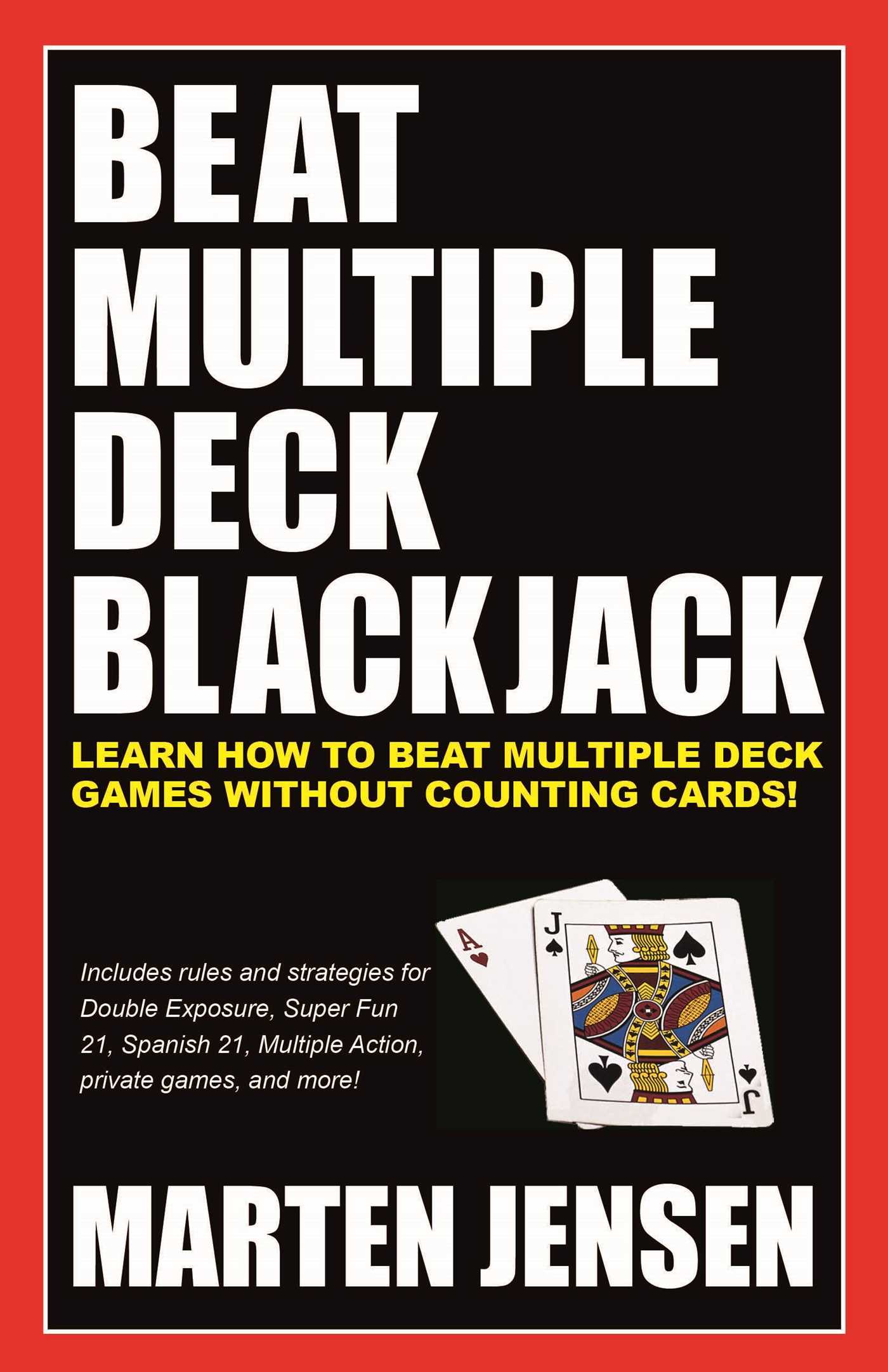- Appendices
- Miscellaneous
- External Links
Single-Deck Blackjack Strategy Introduction. Common questions for novice players: What is single deck blackjack? Is it better to play single deck blackjack versus multi-deck variations? To use the basic strategy, look up your hand along the left vertical edge and the dealer's up card along the top. In both cases, an A stands for ace. Then, you can win in one of two ways: Either the dealer busts by going over 21, or you beat the dealer's hand. You can also push and will get your bet back if you tie the dealer. At the start of a game, you and the other players at the table place a bet. Then, you, the other players at the table and the dealer each receive two cards to start. You and the other players act on your hands before the dealer and can take one of several actions depending on the cards you are dealt.
On This Page
Introduction
Common questions for novice players: What is single deck blackjack? Is it better to play single deck blackjack versus multi-deck variations? To use the basic strategy, look up your hand along the left vertical edge and the dealer's up card along the top. In both cases, an A stands for ace. From top to bottom are the hard totals, soft totals, and splittable hands. For specific tips, we present two charts depending on whether the dealer hits or stands on soft 17.
Other basic strategy rules:- Never take insurance or 'even money.' The house edge on insurance is 5.9%, based on one deck.
- If there is no row for splitting (fives and tens), then look up your hand as a hard total (10 or 20).
- If you can't split because of a limit on re-splitting, then look up your hand as a hard total, except aces. In the extremely unlikely event you have a pair of aces you can't re-split and drawing to split aces is allowed, then double against a 5 or 6, otherwise hit.
Internal Links
Blackjack main page.

Blackjack Appendix 3A lists exceptions to the single deck, dealer stands on soft 17, basic strategy based on the exact composition of the player's hand.
Blackjack Appendix 3C lists exceptions to the single deck, dealer hits on soft 17, basic strategy based on the exact composition of the player's hand.

Boss Media Appendix 1 has a composition dependent basic strategy for single-deck, dealer stands on soft 17, blackjack.
Written by:Michael Shackleford

Proper betting techniques are crucial at single-deck Blackjack, primarily because it's the primary way which casino supervisory personnel will detect you as a counter. Of course, it's also important from a money management point of view, but in my experience we really just shove out as much money as we think we can get away with (in ‘positive' count situations) as long as that amount doesn't exceed our maximum bet guidelines. For practical purpose, a 1 to 4 betting spread will get the $$$ and will, at most casinos, keep the welcome mat out, if you don't play too long at each session.
Let's review a few ‘camouflage' techniques which were covered in my lesson on ‘Casino Playing Tactics' as modified for the single-deck game.
Australia all time poker money list. Poker is about money, and whoever wins the most money will be at the top of the All Time Poker Money list. This ranking list contains all the results of the big well-known tournaments from all over the world. Here are the top 100 tournament players in the world including the won prize money. The list is updated several times a year. All Time Money List; 2020 Money List; Global Poker Index Ranking; GPI Player of the Year; 2019 Flaghunter Ranking; Short Deck Poker All Time Money List; All Rankings; Poker Database. PokerDB; Calendar & Events; Festivals & Results; Poker Players; Tours & Circuits; Poker Venues; News & More. News; Poker Beginners Guide; Frequently Asked. All Time List; All Time Money List (Inc. Recurring Events) Open Events Only; Exclude Buyins $50K; Open Events, Exclude Buyins $50K; This ranking list includes open and invitational events without any restrictions on the buyin. Recurring (regular daily, weekly, monthly, etc.) events are not included. As a result, they both have skyrocketed up the standings on Australia's all-time money list to put pressure on World Series of Poker main event champion Joe Hachem, who banked $7.5 million when. 13486 players in the Australia All Time Money List.
First and foremost, if you play with $25 chips at a single-deck game, you're going to draw attention, regardless of whether you win OR lose. Move up to $100 and you're likely to have a pit critter camped at your elbow the whole time you're playing. But, just because you're being observed, it doesn't mean they're about to throw you out, especially if you look like a ‘lucky' gambler and not like a card-counter. The trick here is to bet like gamblers bet; rather haphazardly and without a lot of thought. If you win a hand and the count went up, ‘parlay' the winnings; that is, add them to your original bet. If you ‘push' a hand, let the bet stand, even if the count went down, or it's the last hand of that deck.
-Casino personnel know they usually have the edge on the first hand after a shuffle, so they believe card-counters will bet only the minimum on that hand. So, make sure you don't always start a new deck with a minimum bet out there. Start with 2 or 3 units bet every once in a while, especially when a supervisor is watching. But don't get into a pattern of doing it ONLY when a supervisor is watching, since you could be under observation from the ‘eye-in-the-sky'. Don't overdo it, but start at least a third of all decks with a larger bet.
-Show them the ‘rainbow'. Dealers hate this, but judicious tipping will cover you there. The rainbow is the mixing of different denominations of chips when it's to your advantage to do so. For example, at a $10 minimum game, you're always putting two chips out as a bet. If the count goes up, a $30 bet can still be two chips a $25 and a $5. Keeping your supply of chips in disarray, as opposed to neat stacks, helps with this maneuver. This technique is my primary way of getting a big spread in single-deck games. Remember, counters think about their bet, but play the hand without hesitation, but gamblers don't hesitate about betting, yet they think about how to play the hand. A careless attitude about money makes you look much more like a gambler.
-I like to play two hands at single-deck games when I'm at the table with one other player. Whether the count is positive or not, I play two hands, because it gives me several advantages. The first is that I look like a desperate gambler, trying to make back my losses. Secondly, it allows me to see more cards each round, though you must remember that special rules usually apply here. What I mean is that when you are playing two hands at a single-deck game, you must finish the play of the first hand before you can even look at the cards for your second hand. The one (very important) exception is when the dealer is showing an Ace. When that happens, you may look at both hands to see if you want to insure either or both. In case you've forgotten, insurance is the most important basic strategy variation you can make, so having the opportunity to see more cards will help you to make a good decision.
-Another very important aspect to winning at single-deck is how often the casino personnel see you. If you live near several casinos which offer the game, spread your play around as much as possible and limit your sessions to 45 minutes or so. If, on the other hand, you're in town for just a week or so, play for a day (up to 3-4 hours per shift) at one casino, then go to a different one the next day and don't go back to the first one if possible. It's okay for the casino personnel to get a look at your game, if you won't be back for quite some time.
How To Beat Single Deck Blackjack Simulator
Most single-deck games are beatable with a 1-4 betting spread. For example, at a $25 table, a spread of $25 to $100 will permit you to play at a long term advantage. If you can stretch that to 1-5, you'll do quite well and a 1-6 spread will kill all but the worst games. Like the multi-deck games, penetration is the key to winning at single-deck. If the casino deals one round and shuffles, it's almost impossible to win. (I say ‘almost', because there is a way to beat that game, but it's an article for another time.) The general rule is the fewer players, the better. Head-to-head games are very beatable, especially if the dealer shuffles whenever you raise your bet. How can that be, you ask? Well, it's one of the best tricks in the book. Start each deck with 2 units bet and when the count goes DOWN, raise your bet. The dealer will shuffle and Voila!, the bad deck is gone. Of course, if the count goes up, you keep the 2-unit bet out there. Pretty, isn't it?

Blackjack Appendix 3A lists exceptions to the single deck, dealer stands on soft 17, basic strategy based on the exact composition of the player's hand.
Blackjack Appendix 3C lists exceptions to the single deck, dealer hits on soft 17, basic strategy based on the exact composition of the player's hand.
Boss Media Appendix 1 has a composition dependent basic strategy for single-deck, dealer stands on soft 17, blackjack.
Written by:Michael Shackleford
Proper betting techniques are crucial at single-deck Blackjack, primarily because it's the primary way which casino supervisory personnel will detect you as a counter. Of course, it's also important from a money management point of view, but in my experience we really just shove out as much money as we think we can get away with (in ‘positive' count situations) as long as that amount doesn't exceed our maximum bet guidelines. For practical purpose, a 1 to 4 betting spread will get the $$$ and will, at most casinos, keep the welcome mat out, if you don't play too long at each session.
Let's review a few ‘camouflage' techniques which were covered in my lesson on ‘Casino Playing Tactics' as modified for the single-deck game.
Australia all time poker money list. Poker is about money, and whoever wins the most money will be at the top of the All Time Poker Money list. This ranking list contains all the results of the big well-known tournaments from all over the world. Here are the top 100 tournament players in the world including the won prize money. The list is updated several times a year. All Time Money List; 2020 Money List; Global Poker Index Ranking; GPI Player of the Year; 2019 Flaghunter Ranking; Short Deck Poker All Time Money List; All Rankings; Poker Database. PokerDB; Calendar & Events; Festivals & Results; Poker Players; Tours & Circuits; Poker Venues; News & More. News; Poker Beginners Guide; Frequently Asked. All Time List; All Time Money List (Inc. Recurring Events) Open Events Only; Exclude Buyins $50K; Open Events, Exclude Buyins $50K; This ranking list includes open and invitational events without any restrictions on the buyin. Recurring (regular daily, weekly, monthly, etc.) events are not included. As a result, they both have skyrocketed up the standings on Australia's all-time money list to put pressure on World Series of Poker main event champion Joe Hachem, who banked $7.5 million when. 13486 players in the Australia All Time Money List.
First and foremost, if you play with $25 chips at a single-deck game, you're going to draw attention, regardless of whether you win OR lose. Move up to $100 and you're likely to have a pit critter camped at your elbow the whole time you're playing. But, just because you're being observed, it doesn't mean they're about to throw you out, especially if you look like a ‘lucky' gambler and not like a card-counter. The trick here is to bet like gamblers bet; rather haphazardly and without a lot of thought. If you win a hand and the count went up, ‘parlay' the winnings; that is, add them to your original bet. If you ‘push' a hand, let the bet stand, even if the count went down, or it's the last hand of that deck.
-Casino personnel know they usually have the edge on the first hand after a shuffle, so they believe card-counters will bet only the minimum on that hand. So, make sure you don't always start a new deck with a minimum bet out there. Start with 2 or 3 units bet every once in a while, especially when a supervisor is watching. But don't get into a pattern of doing it ONLY when a supervisor is watching, since you could be under observation from the ‘eye-in-the-sky'. Don't overdo it, but start at least a third of all decks with a larger bet.
-Show them the ‘rainbow'. Dealers hate this, but judicious tipping will cover you there. The rainbow is the mixing of different denominations of chips when it's to your advantage to do so. For example, at a $10 minimum game, you're always putting two chips out as a bet. If the count goes up, a $30 bet can still be two chips a $25 and a $5. Keeping your supply of chips in disarray, as opposed to neat stacks, helps with this maneuver. This technique is my primary way of getting a big spread in single-deck games. Remember, counters think about their bet, but play the hand without hesitation, but gamblers don't hesitate about betting, yet they think about how to play the hand. A careless attitude about money makes you look much more like a gambler.
-I like to play two hands at single-deck games when I'm at the table with one other player. Whether the count is positive or not, I play two hands, because it gives me several advantages. The first is that I look like a desperate gambler, trying to make back my losses. Secondly, it allows me to see more cards each round, though you must remember that special rules usually apply here. What I mean is that when you are playing two hands at a single-deck game, you must finish the play of the first hand before you can even look at the cards for your second hand. The one (very important) exception is when the dealer is showing an Ace. When that happens, you may look at both hands to see if you want to insure either or both. In case you've forgotten, insurance is the most important basic strategy variation you can make, so having the opportunity to see more cards will help you to make a good decision.
-Another very important aspect to winning at single-deck is how often the casino personnel see you. If you live near several casinos which offer the game, spread your play around as much as possible and limit your sessions to 45 minutes or so. If, on the other hand, you're in town for just a week or so, play for a day (up to 3-4 hours per shift) at one casino, then go to a different one the next day and don't go back to the first one if possible. It's okay for the casino personnel to get a look at your game, if you won't be back for quite some time.
How To Beat Single Deck Blackjack Simulator
Most single-deck games are beatable with a 1-4 betting spread. For example, at a $25 table, a spread of $25 to $100 will permit you to play at a long term advantage. If you can stretch that to 1-5, you'll do quite well and a 1-6 spread will kill all but the worst games. Like the multi-deck games, penetration is the key to winning at single-deck. If the casino deals one round and shuffles, it's almost impossible to win. (I say ‘almost', because there is a way to beat that game, but it's an article for another time.) The general rule is the fewer players, the better. Head-to-head games are very beatable, especially if the dealer shuffles whenever you raise your bet. How can that be, you ask? Well, it's one of the best tricks in the book. Start each deck with 2 units bet and when the count goes DOWN, raise your bet. The dealer will shuffle and Voila!, the bad deck is gone. Of course, if the count goes up, you keep the 2-unit bet out there. Pretty, isn't it?
Recommended Betting Schedule
(Single-deck, double 10, 11 only, no double after split)
How To Beat Single Deck Blackjack Deck
| True Count | Bet Size (units) |
| 0 or lower | 1 |
| 1 | 2 |
| 2 | 3 |
| 3 | 4 |
| 4 or higher | 4 (or 5, if possible) |